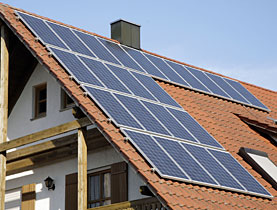Moving pictures powered by light of day

One of the 2008 Swiss Solar Prizes has been awarded to the creators of a travelling picture show that uses the power of the sun to light up the big screen.
For the past two years, Christof Seiler and Reto Schmid have been on the road with their Cinéma Solaire, collecting energy during the day and showing movies at night.
The idea is simple: a sail with flexible solar cells, a battery pack and a 16-millimetre projector are all it takes for this sustainable project.
“During the day we are collecting light and in the evening we are letting it loose again via the projector,” Seiler told swissinfo.
The energy collected by the 15-square-metre sail is fed into black boxes containing a large battery for storage and an alternator that converts the current to 220 volts, the household standard in Europe.
The power equipment actually weighs in at less than 35 kilograms.
Seiler and Schmid spent a lengthy period testing and developing their system before it was ready for regular use.
The design was one part of the equation, finding the right parts was another. Many of them are special or handmade.
The solar cells they chose, which are attached to the sail by zips, are the only ones of their type that can be rolled up. The boxes that house everything for transport were made by a carpenter and fit on specially built bicycle trailers.
This means Schmid and Seiler operate the only open-air travelling picture show in Switzerland that uses bicycles to move between locations, giving them extra flexibility.
“We can set up our movie theatre anywhere,” said Seiler. “It can be on a mountain or out in a pasture because we don’t need a power outlet.”
“The equipment is small, easy to handle and it only takes an hour to set up, which means we are very mobile,” he added.
Classic films
The Cinéma Solaire doesn’t just operate in sunny locations in the countryside, but also in cities. There has been a lot interest in the Seiler and Schmid’s product in places such as Basel and Zurich.
“People are amazed at how easy it is for Cinéma Solaire to run on sun power alone,” Seiler told swissinfo.
The duo aren’t just ecologists who want to implement their ideas about sustainability though.
They are also movie fans who particularly appreciate old 16-millimetre films, so it’s no surprise that they chose a projector with this format for their project.
“It’s true that the selection of films available in this format is somewhat restricted,” admits Seiler, ” but the quality is much better than what you would get from one of today’s beamers.”
Spectators at Cinéma Solaire get to enjoy classics such as the Ladykillers, A Midsummer Night’s Sex Comedy or A Man and a Woman.
However before people can sit down and enjoy an evening’s entertainment, there is one small restriction: to work, the travelling picture show needs a sunny day. Clouds mean that the screen stays dark at night.
swissinfo, Renat Künzi
The Swiss solar Prize has been awarded annually since 1991.
It is aimed at encouraging local authorities, private companies and individuals to build solar installations without using extra land.
Solar thermal application: solar radiation is absorbed on a black surface and used to heat water. It can be stored and used as needed.
Photovoltaics: this is the direct conversion of solar energy to electricity. This can be stored in batteries. An electronic inverter can be used to convert the energy into normal electricity in households and this can be distributed to the electricity network.
According to Swissolar, in 2007 there were around 55,000 solar installations in Switzerland. Around 6,500 photovoltaic collectors were sold last year, up from 2,500 in 2006, in preparation for the May 1 measure.
Experts say the potential for solar energy is enormous. But the high cost of its collection, conversion, and storage still limits its exploitation.

In compliance with the JTI standards
More: SWI swissinfo.ch certified by the Journalism Trust Initiative










You can find an overview of ongoing debates with our journalists here . Please join us!
If you want to start a conversation about a topic raised in this article or want to report factual errors, email us at english@swissinfo.ch.